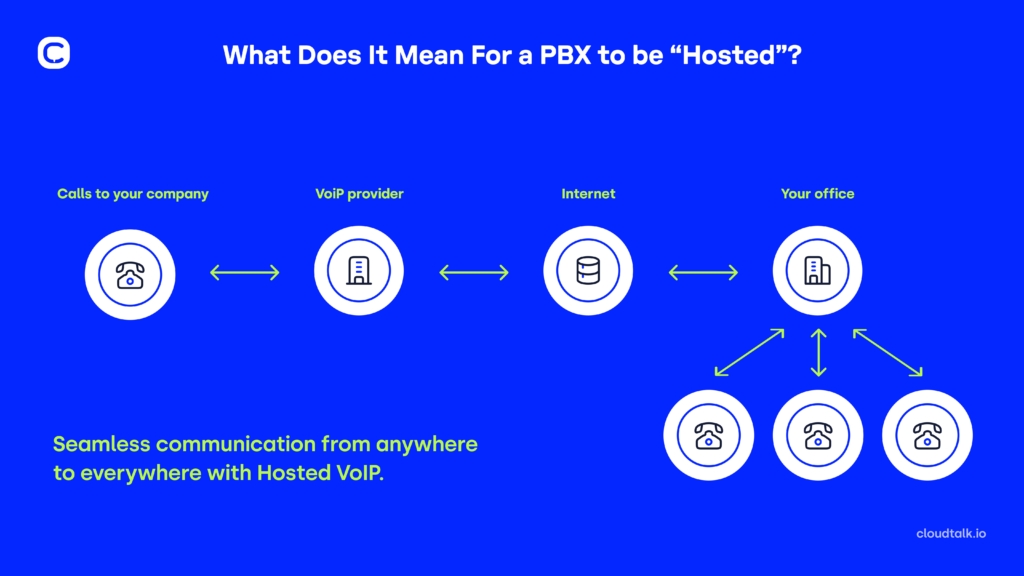Understand Hosted VoIP: Benefits, Features, and Importance
The global VoIP market is expected to reach nearly USD 102.5 billion by 2026. This surge is driven by an increased preference for cloud-based solutions. But the costs of VoIP services are predicted to go up by only 3% in the forthcoming two years. So that software might just be the thing you were looking for.
In the ongoing quest for more cost-effective and efficient communication systems hosted VoIP becomes the key for smart companies. A hosted call center solution can handle all your inbound, outbound, and self-service customer interactions effortlessly, all in one place.
This method eliminates the hassle of dealing with complicated telephony hardware on your premises. Instead, a third-party provider handles everything, offering scalable and flexible voice services that grow with your business.
Want to see what this technology can do for you? Keep reading!
Key Takeaways:
- Hosted VoIP usually comes with more features than traditional systems, such as call forwarding, voicemail-to-email, and smart dialer.
- With a hosted VoIP, you can save costs on long-distance calls and infrastructure.
- Hosted VoIP call centers can easily scale with your business, adding or removing lines with minimal effort.
- Setting up a hosted VoIP call center can be straightforward and easy when supported by the right provider.
What is Hosted Voip?
Hosted VoIP (Voice over Internet Protocol) is a modern telecommunication service where your phone calls are made over the Internet rather than through traditional copper telephone lines.
Unlike traditional telephony that requires on-premises Private Branch Exchange (PBX) hardware to route calls, hosted VoIP simplifies the setup by delegating the technical details to an external provider. This means you don’t have to worry about maintaining or updating hardware.
In comparisons between VoIP vs. landline or VoIP vs. Cellular, hosted VoIP usually comes with more features than traditional systems, such as call forwarding, Voicemail to Email, and Power Dialer, all integrated into one platform.
These capabilities go hand in hand with reduced costs for long-distance calls and infrastructure such as servers, network connections and related equipment. An external provider hosts and manages all VoIP software and servers at an offsite location for this service.
Hosted vs On-premise Voip
Get a clear overview of the fundamental differences between hosted and on-premise VoIP solutions. Decide which one might be best suited for your business needs.
Aspect
Hosted VoIP
On-Premise VoIP
Initial Cost
Lower initial costs as there is no need for substantial hardware investments.
Higher initial costs due to purchasing and installing PBX hardware and software.
Maintenance
Your service provider manages maintenance, updates, and upgrades.
Businesses are responsible for ongoing maintenance, updates, and hardware replacements.
Scalability
Easily scalable; can add or remove services and features as needed through the provider.
Scaling requires physical hardware changes and may be limited by existing infrastructure.
Control and Customization
Limited control over the system; you depend on the provider’s offered features and options.
High level of control with the ability to customize solutions and integrate with other systems as desired.
Reliability and Uptime
Dependent on internet reliability and your provider’s ability to manage uptime.
Control over the entire system can potentially increase reliability, but depends on in-house expertise.
Security
Security managed by your provider, which can be a benefit if they have strong, up-to-date security measures.
Requires in-house security measures, which can be more robust if managed properly, but increases responsibility.
How Hosted VoIP Works
Hosted VoIP operates by converting your voice into digital signals that travel over the internet. Here’s a breakdown:
- Voice Conversion: When you speak into a VoIP-enabled phone or headset, the device converts the analog sound of your voice into digital data packets.
- Data Transmission: These packets are sent over the internet to a VoIP service provider. This transmission can be done using a regular broadband internet connection.
- Call Routing: The VoIP service provider’s hosted servers receive these digital packets and route them to the intended recipient’s phone system. This happens almost instantaneously.
- Reconversion: At the receiving end, these digital packets are converted back into sound.
- Integrated Features: Throughout this process, additional features such as Voicemail, Call Forwarding, and Caller ID are integrated seamlessly by the provider’s hosted servers.
For more detailed information, read on here: How does a voip work?
How does hosted PBX work?
Hosted PBX, or Private Branch Exchange, is a type of phone system that’s managed offsite by a VoIP service provider. Here’s how it generally works:
- Setup Connection: You connect to the hosted PBX service via the internet using IP phones or software-based phones on computers or smartphones.
- Call Routing: When a call is made, the hosted PBX system routes the call through the internet to the appropriate extension or outside line. This is managed by the service provider’s data centers, ensuring that calls are directed correctly, whether they’re incoming, outgoing, or internal.
- Feature Integration: Hosted PBX systems come with a variety of features such as Voicemail, Call Forwarding, Call Waiting, and Conferencing. These features are integrated into the system by the provider and you can customize them via a web-based calling solution.
- Maintenance and Updates: The service provider is responsible for maintaining the PBX technology, including updates and security patches, ensuring the system is stable, safe, and up to date.

The whole setup removes the need for you to house and manage your own PBX hardware, reducing IT demands and overhead costs while providing scalability and flexibility.
Learn more about VoIP vs. PBX communication systems.
The Benefits of Hosted VoIP for Businesses
Hosted VoIP offers several advantages when you are looking to improve your communication systems:
- Safe costs: You don’t need to pay for purchasing, maintaining, and upgrading on-site PBX equipment. Additionally, you don’t have to pay extra for long-distance and international calls. Our hosted call center pricing guide gives you an idea of what costs to expect.
- Scale Your Business Effortlessly: Hosted VoIP adapts easily to your business growth or changes in demand. You can add new lines or features without major changes to your infrastructure like investing in additional phone lines or hardware.
- Enhance Remote Work with Flexible VoIP Solutions: Hosted VoIP lets your employees access the business phone system from anywhere with an internet connection, perfect for remote work and distributed teams.
- Enable Advanced Capabilities: Hosted VoIP offers a suite of advanced features such as Auto-Attendant, Voicemail-to-Email, and Call Forwarding, often unavailable with traditional phone systems.
- Simplify Management: As it is managed by the service provider like CloudTalk, hosted VoIP reduces the IT workload. You can manage your specific settings via a user-friendly interface.
- Ensure Consistent Service: Service providers often deliver a high level of reliability and robustness in their networks to minimize downtime and ensure consistent service.
- Improve Customer Experience: You can optimize features such as Call Routing, Call Queues, and On-hold messages to improve the customer experience, making interactions smoother and more professional.
Best Hosted VoIP Features
CloudTalk offers a variety of hosted VoIP features that cater to the needs of modern businesses.
Here are some that stand out:
- Smart Dialer: Automatically dials numbers from a predefined list, maximizing the efficiency of outbound call campaigns. This is particularly valuable for you when you want to increase your call volume.
- Call Recording: Records calls for quality assurance, training, or legal compliance. This feature ensures that you can review interactions and maintain high standards of service.
- Interactive Voice Response (IVR): Directs callers through a menu system to the appropriate department or agent, reducing wait times and improving customer satisfaction.
- Call Queuing: Manages incoming calls efficiently by placing them in a queue until the next agent is available. It ensures that customer calls are answered in an orderly fashion.
- Voicemail: you can review and respond to incoming messages directly through the app, and even have voicemail transcriptions send directly to your email.
- Real-Time Customer Card: Displays customer information during calls, providing you or your agents with context and history. It can lead to more personalized and effective interactions.
- International Numbers: Provides local numbers for different countries, making it easier to establish a local presence and connect with customers globally.
- Statistics and Reporting: Provides detailed insights into call logs, agent performance, and customer interactions, which helps you to make informed decisions based on actual data.
How to Set Up a Hosted VoIP Call Center
Setting up a hosted VoIP call center is pretty straightforward, especially when following a clear step-by-step process.
Here’s how to do it:
1. Choose a Hosted VoIP Provider:
- Research Providers: Look for a provider that matches your business needs in terms of features, reliability, customer support, and price. To explore a range of options that might be suitable for your business, consider visiting our comprehensive guide on VoIP alternatives.
- Evaluate Features: Ensure the provider offers the VoIP features your business requires, such as Call Forwarding, Voicemail-to-Email, and Conference Calling.
2. Plan For Your VoIP System
- Determine Needs: Assess how many users you have, the number of concurrent calls you expect, and any specific requirements like international calling.
- Select Equipment: Decide if you will use existing hardware (possibly with ATA – analog telephone adapters) or purchase new IP phones compatible with your provider.
3. Set Up Your Account and Configure Settings
- Create Account: Sign up with your chosen provider and create your account.
- Configure Settings: Use the provider’s web portal to configure system settings, user accounts, and call routing options according to your business workflow.
4. Install VoIP Equipment
- Setup Hardware: Connect your VoIP hardware to your network. This might involve plugging IP phones into your network or setting up ATA adapters for traditional phones.
- Install Software: If you use softphones, it is necessary to install the VoIP on computers or mobile devices.
5. Test and Train
- Perform Tests: Make test calls within your network and to external numbers. Double-check if everything is working correctly. Make sure that your audio is clear and all features function properly.
- Train Your Team: Educate your employees on how to use the new VoIP system, highlighting key features and troubleshooting basic issues.
Want to learn more? Check out our definite guide on VoIP.

Conclusion
Hosted VoIP can greatly improve how your business communicates. It offers cost savings, scalability, flexibility, and advanced features, marking a major shift from traditional phone systems.
By adopting this technology, you’ll streamline communication and support your business’s growth as it adapts to changing needs. Whether you’re looking to improve customer interaction or simplify internal communications, hosted VoIP offers a powerful solution tailored to the modern business environment.
FAQs
What is cloud-hosted VoIP?
Cloud-hosted VoIP is a service where your voice communication is handled over the internet by a third-party provider, meaning you don’t need to install or maintain any complex hardware at your office. It’s a great fit if you prefer a low-maintenance solution that allows you and your team to work flexibly from anywhere.
What is self-hosted VoIP?
In a self-hosted VoIP setup, you own and maintain your communication infrastructure. This setup is within your business premises using your own servers. If you like having full control and are willing to handle the technical maintenance, this might be the right choice for you.
Which is the best hosted VoIP provider for me?
The best hosted VoIP provider for you depends on what you’re looking for in terms of features, price, and the scale of service. Think about what specific features are most important for your business and compare providers to find the best fit.
How much will VoIP cost me?
The cost of VoIP services can vary, starting from around $10 to $20 per user each month for basic plans. If you need more advanced features like integration capabilities with other tools, premium support, or analytics, prices can go up to $30 to $50 per user per month. Keep in mind, there might be one-time costs for setup or additional hardware if you’re not using existing devices. Getting a detailed quote based on your needs will give you a clearer picture of the costs involved.
























